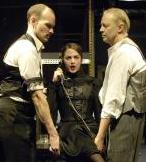SEARCH
REVIEWS
FEATURES
NEWS
Etcetera and
Short Term Listings
LISTINGS
Broadway
Off-Broadway
BOOKS and CDs
OTHER PLACES
Berkshires
London
LA/San Diego
Philadelphia
Elsewhere
QUOTES
On TKTS
LETTERS TO EDITOR
FILM
LINKS
MISCELLANEOUS
Free Updates
Masthead
Writing for us
A CurtainUp  London Review
London Review
 London Review
London ReviewSwitch Triptych
by Neil Dowden
|
That you would design to replace this voice, this mind, this spirit, with a machine, is a sacrilege . . . this corporation will be demolished by an angry, vengeful God, who does not accept the profit margin as an adequate excuse for replacing human beings with soulless automatons!
--- Lucille |

Drew Friedman as Andrew, Stephanie Viola as Lucille and Paul Schnabel as Truman
(Photo: Geraint Lewis) |
Although, like all their previous plays, Switch Triptych is written (and directed) by co-founder Adriano Shaplin and again mixes absurd comedy with political satire, this is the Riot Group's first period piece. Set in a New York City telephone exchange in 1919, it focuses on three female switchboard operators and their two male managers as automation threatens to make them redundant.
The "Queen Bee" Lucille (Stephanie Viola), a first-generation Italian immigrant who relishes her power to connect or disconnect callers and who prioritizes businesses who bribe her, embodies an individualist attitude that clashes not only with increasingly mechanized society but also with the organized labour that the new girl, English trade unionist June (Cassandra Friend), claims is their only hope.
The scenario has plenty of dramatic potential, as it sets up conflicts between human and machine, the individual and the collective, corporate capitalism and worker power, as well as gender and ethnic tensions. But Shaplin's self-conscious and over-wrought language, though often punchy and sometimes witty, ultimately alienates us rather than draws us in. For a play about the dehumanizing effects of technological and market-driven forces, it's frustratingly difficult to sympathize with any of the protagonists, who are more mouthpieces than flesh-and-blood characters.
Stephanie Viola's inebriated Lucille is a striking presence to start with, as she rants forth between swigs from various bottles, but her verbosity soon becomes monotonous as her stylized delivery is all on one note. The transformation of Cassandra Friend's June from demure outsider to rebellious socialist is not very convincing, while Sarah Sanford makes little impact as the third member of the triptych, the passive Philippa. When Paul Schnabel's mild-mannered Truman clashes - literally - with Drew Friedman's ambitious Andrew, it is one of the few moments of genuine interaction on stage in a play that overall fails to connect.
|
SWITCH TRIPTYCH Written and directed by Adriano Shaplin With: Stephanie Viola, Sarah Sanford, Paul Schnabel, Drew Friedman, Cassandra Friend Design: Jim Findlay Lighting: William Cusick Sound: Iver Findlay Running time: 1 hour 20 minutes with no interval A Riot Group Production Box Office: 0870 429 6883 Booking until 8th October 2005 Reviewed by Neil Dowden based on 9th September performance at the Soho Theatre, Dean Street, London W1 (Tube: Tottenham Court Road) |





